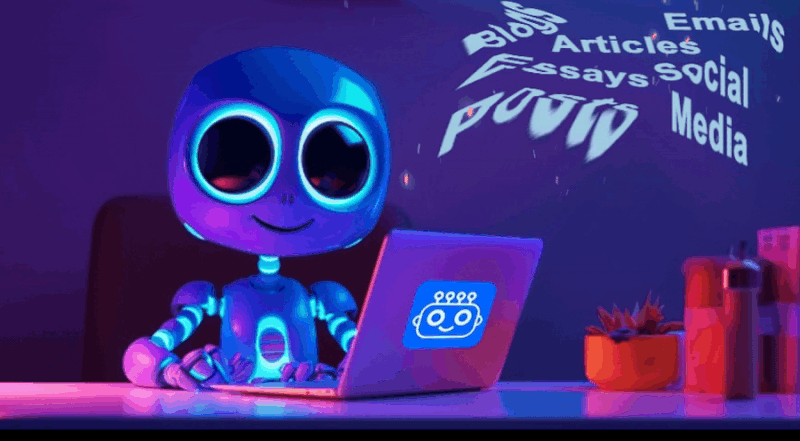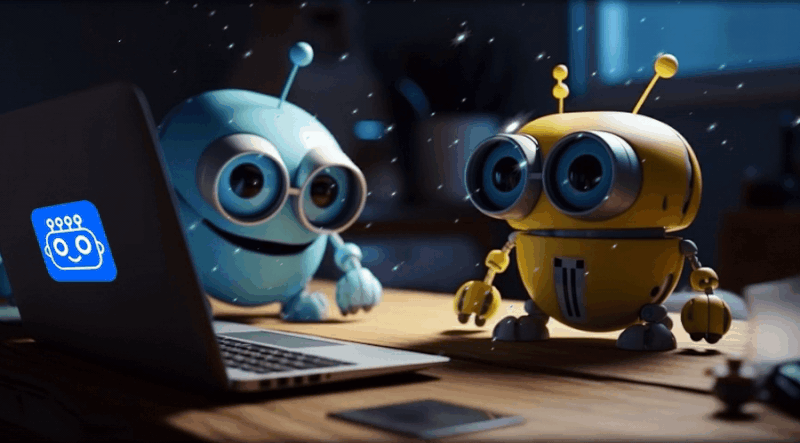AI Writing Tools Are The Perfect Cure For The Dreaded Blank Page Syndrome
Ever had a lightbulb moment about how much artificial intelligence (AI), especially AI writing, has stirred up our lives?
Picture this. You’re at your desk, staring at a glaringly empty screen, and bam!
You’ve got an AI writing tool that helps you spin your thoughts into smooth and articulate sentences.
No kidding, folks, this isn’t some pipe dream anymore. We’re living it, right here, right now.
You see, the crossroads of language and AI tech have whipped up something astoundingly groundbreaking: AI writing tools.
This ain’t just another shiny toy for the tech-savvy. Nah, it’s more like a powerhouse comrade that’s reshaping how we write and chat in this digital age.
As we wade deeper into this, we’re going to unravel why AI writing ain’t just a snazzy idea anymore, but a critical piece of our digital kit.
From Typewriter To AI Writing Tools
Let’s take a little trip down memory lane, shall we?
The story of writing aids goes way back, as far back as writing itself. You remember those charming typewriters, don’t ya?
The click-clack of every key, turning thoughts into words on a sheet of paper. They were the bee’s knees back in the day.
As the years rolled on, we saw computers, word processors, and the Internet come into play, each one aiming to make writing a bit easier.
But here’s where the plot thickens.
The arrival of AI writing tools is a massive leap in this evolution.
Why, you ask?
Well, it’s simple. Unlike their old-school kin, AI writing tools aren’t just idle platforms for us to bang out our thoughts.
Nope, they’ve stepped up their game, helping us cook up ideas, craft content, and even polish our work.
Picture this: feeding a computer a basic idea, and it dishes out a well-written draft for ya.
That’s the magic AI writing tools are packing.
Instead of a tauntingly blinking cursor on an empty page, you’ve got a co-writer to jump-start your writing, boosting productivity, and firing up creativity.
These AI writing tools aren’t just ushering us from the typewriter era to the digital age—they’re catapulting us into a new era of lively and dynamic writing.
And folks, this is just the tip of the iceberg.
Unpacking The Potential: The Core Benefits Of AI Writing Tools
So, let’s hit the pause button for a hot minute and really take in all the perks AI writing tools have got going for them. It’s like cracking open a loot box stacked with all sorts of goodies!
First up, think about kicking writer’s block to the curb. That terrifying blank page doesn’t look so scary now, does it?
With an AI writing tool, you’ve got a buddy to help spark up that creative engine. Toss in a few key points, and voila! You’ve got yourself a rough draft to mold.
Next, let’s gab about speed and efficiency. With AI writing tools, you can whip up content faster than a seasoned scribe chugging coffee.
Got to crank out a dozen blog posts by Friday?
Piece of cake, your AI writing tool’s got your six.
And what about keeping things consistent and spot-on?
Yeah, these tools nail that too! They can help keep your writing tone and style steady across the board.
Want to sound like a pro? Or maybe you’re going for that casual, friendly vibe?
Just give your AI writing tool the memo, and it’ll get the job done. Plus, they’re aces at editing and proofreading, too.
Say sayonara to those annoying grammar flubs and typos!
And last but definitely not least, these tools can make us better wordsmiths. Working with an AI writing tool can show us fresh ways to structure sentences, articulate ideas, and broaden our vocabulary.
They’re more than just tools—they’re mentors!
It’s crystal clear that AI writing tools aren’t just shaking up our writing routine—they’re boosting it, making it quicker, more streamlined, and more effective. They’re like a secret ace up a writer’s sleeve, something that’s quickly becoming a must-have in this digital world.
Now, doesn’t that just sound peachy keen?
Considerations: Addressing The Challenges Of AI Writing
But wait a tick, before we go head over heels, let’s not turn a blind eye to the big ol’ elephant in the room.
Sure, AI writing tools are game-changers, but are they perfect?
Let’s chew the cud on this one.
One potential hiccup circles around the question of authenticity. Can a bunch of code really mimic the complexity and depth of human emotion in writing? Does leaning on an AI writing tool make our writing seem less real, less human?
And let’s not forget about the risk of overdependence.
Like with any tool, there’s the danger of getting too attached. We could end up depending too much on these gizmos, risking our own writing chops taking a nosedive.
Do we want to keep our knack for crafting a gorgeous sentence or a knock-out argument, or are we cool with passing these tasks off to an AI?
Then there’s the matter of creativity and originality. Yeah, an AI can churn out content based on what it’s been fed, but can it truly whip up something new, something unexpected?
Can it think outside its coded box and wow us with a jaw-dropping idea?
These are heavy questions we need to wrestle with as we cozy up to AI writing tools in our daily lives. It’s crucial to find that sweet spot, harnessing the power of these tools while keeping our uniquely human touch in our writing.
What’s your take? Where should we draw the line?
Ahead Of The Curve: The Transformative Impact And Future Of AI Writing
As we cruise into tomorrow, it’s clear as day that AI writing tools aren’t some flash-in-the-pan fad.
They’re here for the long haul, and their impact is gonna keep spreading like wildfire across all sorts of fields.
Now, let’s borrow some wisdom from an AI whiz, Dr. Jane K. Simmons, who said, “The boom in AI writing tools ain’t a ripple—it’s a tsunami. It’s totally revamping our communication landscape and its impact ain’t gonna fade anytime soon.”
Just picture this—newsrooms of the future where AI writing tools are cranking out spot-on, fact-based news pieces, freeing up journalists to dive deep into the nitty-gritty investigative stuff.
Or how about classrooms where students are getting buddy-buddy with these tools to flex their writing muscles, turning the drudgery of writing into a fun, team effort?
Let’s not forget businesses where marketing hotshots are using AI writing tools to whip up personalized content like there’s no tomorrow.
And what about authors?
Picture them using these tools to knock out writer’s block and speed up the whole drafting process, leaving them more time to refine and buff their work till it shines.
But hey, while we’re busy getting starry-eyed over these cool prospects, we gotta remember to stay sharp about the hiccups we chatted about earlier.
The future of AI writing needs to be a mix of the get-up-and-go and productivity of AI, with the soul, emotion, and realness that’s all human. In that blend, there lies the real deal potential of AI writing tools.
So, as we buckle up for this thrilling ride, how do you see AI writing tools shaping up your day-to-day grind?
The Inevitable Rise Of AI Writing
So, what’s the bottom line here?
Well, folks, we’re parked right at the crossroads of excitement city.
We’re smack in the middle of a shake-up in the world of writing, and it’s all thanks to these AI writing tools.
These gizmos are jazzing up the whole writing scene, making it faster, more approachable, and a whole lot more fun. They’re beefing up businesses, helping out students, backing up authors, and that’s just for starters.
But, like with any powerhouse tool, it’s key to use AI writing with a good head on our shoulders, balancing its strong points with a sharp eye on the potential speed bumps.
As we hit the gas and drive forward, we gotta work on marrying the best of AI’s mojo with the one-of-a-kind flair and creative spark that makes us human.
The rise of AI writing tools is a sure thing.
And so, here we are, on the edge of a brand-new chapter in writing. The big question ain’t if we’ll use these tools, but how we’re gonna use them.
As we wrap our heads around that, we’re set to not just reshape our writing, but also the whole shebang of how we communicate and express ourselves in this digital world.
So, are you strapped in and ready to take on the future of writing?


















